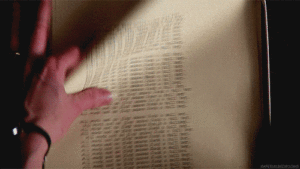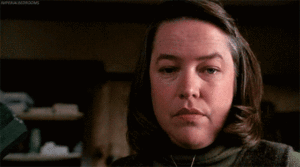Freelance Friday: Let Stephen King Teach You How to Edit Your Own Writing
March 10th, 2017 by
This blog is part of our Freelance Friday series, where we discuss everything and anything related to freelancing. Consider following our Freelance Twitter account.
Stephen King once said, “To write is human, to edit is divine.” Writing and editing go hand-in-hand. You cannot have one without the other. Like a novel or short story, every blog post, page of web content, and even social media post must be edited before it is published.
While many writers can (thankfully) depend on outside editors for their work, many freelance writers must rely on themselves for editing—a tricky and sometimes mistake-prone arrangement.
Even for writers who have the benefit of an unaffiliated editor, self-editing is the first line of defense and an important one. Mistakes happen and simple issues are easy to overlook. Improving your competency as a self-editor will only benefit your writing.
Here are 10 easy tips for editing your own writing:
1. Read It Aloud
This is perhaps the most common and easiest tip, nonetheless, an important and proven one. Reading out loud to yourself–or to another person–can highlight glaring errors that you might have missed. When you read silently, your mind will often compensate for the errors, such as missed words, because it knows they should be there. Reading aloud helps expose those oversights. Plus, things always sound better in your head, but your writing is smoother and more colloquial when easily read aloud.
2. Set It Aside, or Better Yet, Sleep on It
After completing an assignment, put it aside and don’t even think about it for a while. Refresh your mind. If possible, sleep on it and let it sit until tomorrow. Return to it when it is not so fresh in your mind and you are not so easily swayed by the post-writing haze. Putting physical distance between it can also put emotional distance between it. A fresh mind will give you a much-needed fresh perspective.
3. Print It Out
Another trick to help you catch those mistakes is to print out your work and edit it by hand rather than on your screen. Getting the chance to review it in another form helps simulate an “outside” editor perspective. Make sure to have your handy red pen ready!

4. Change the Format/Style
This tip works similarly to printing it out, but if you don’t have access to a printer, these changes should work just as well. Change the text to a different font, bigger size, or even a different color. You can also convert regular text into HTML for an altered view. Seeing things in a different format often sheds new light on something you have been working on for a long time.
5. Read It Backward
Though this may seem odd, it actually works! You will be surprised at how many misspellings and typos you will ultimately find. It forces you to read more slowly and carefully, plus, it helps you focus on the actual text rather than getting distracted by the context.
6. Focus on One Thing at a Time
Don’t waste time editing every word and every sentence. Accept the fact that some things, even major chunks, will be cut out in the edit. To avoid wasting time editing something you are just going to remove anyway, do the “big picture” editing first by starting with structure and overall content. Major cuts, additions, and rewrites need to happen before you focus on the individual words and sentences.
7. Know Your Writing Weaknesses
If you are an experienced writer, you should know your own weaknesses—from simple things like words/phrases you overuse, typos you often make, and common spelling errors to more complex issues like active and passive voice. Identifying these beforehand will make them easier to find and fix while editing.
8. Make Time for Multiple Rounds of Edits
As stated previously, time brings all things to light. The more time that passes in between writing and editing, the more detached you are and the better your writing can become. Write, break, edit, repeat. And if the mere thought of editing seems daunting, you can break it up as well. One read-through can be for big picture things, the next for punctuation, another can be dedicated to common errors, and so on.
9. Don’t Over Edit
We have talked a lot about what needs to be edited and how to edit, but is there such a thing as over-editing? The optimal middle ground exists somewhere in between an impossible grasp for perfection and those too negligent to run spell check. In the end, editing is about being efficient and improving the content, not rewriting it.

10. Be Ruthless
Finally, don’t be afraid to edit yourself. It doesn’t make you a bad writer, it makes you a good editor—two sides of the same coin. Ultimately, being a better editor will, in turn, make you a better writer. Keep paragraphs short. Reduce sentences to only their essential parts. Avoid overusing clauses, adverbs, and too many adjectives. When editing, you are no longer looking at it as the writer; instead, you should approach the piece from the POV of the reader.
To end with another famous editing quote—one that has been attributed to many different writers over the years in many different iterations, but perhaps best recapitulated by, again, Stephen King: “Kill your darlings, kill your darlings, even when it breaks your egocentric little scribbler’s heart, kill your darlings.”
Be ruthless in your editing. In the end, the writer in you will thank you.








Great blog post! I will definitely keep this in mind.
Awesome tips Chris! I think, it’s also better to have someone read and point out the wrong grammars and misspells. But I wanna know how many times do we have to read and edit our own writing?
Very helpful post! It’s important to know how to edit your own writing, especially as company’s blogs and social media platforms are becoming increasingly important. I have never tried reading the page backwards and I am excited to try that out. I think the most difficult yet important tip is to make time for multiple rounds of edits, especially when I am crunched for time. I will keep all of these tips in mind when writing and I will start to be ruthless in my editing.
Maggie Baird
May, 2018
Freeman School of Business, Tulane University